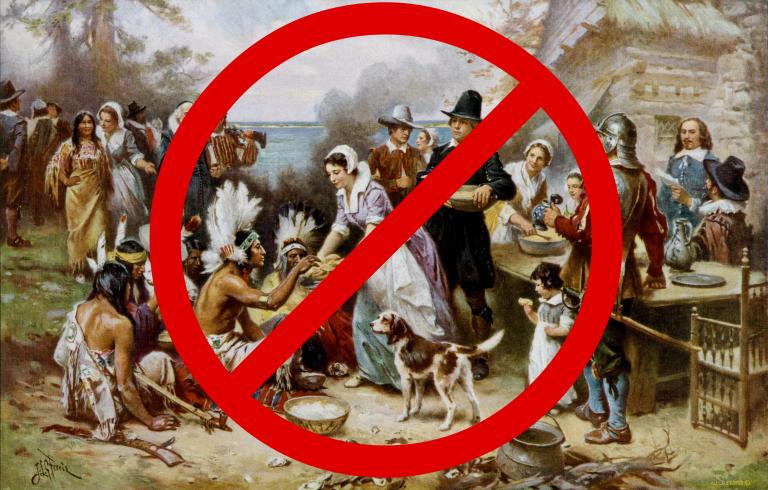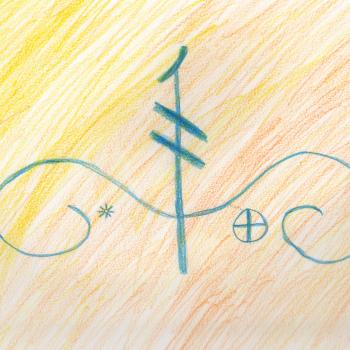…but our mythology about Thanksgiving is
It has become fashionable lately among the “woke” set to decry Thanksgiving as an expression of white supremacist settler colonialism.
As if a holiday centered around overeating, in a nation plagued with dangerous obesity, were not already problematic enough; and as if the accompanying orgy of consumer capitalism — once left until Black Friday, but now pushed back into Thanksgiving itself — did not already give us cause to look askance at this Great American Sabbat.
But unlike the other holiday being decried as colonialist, Columbus Day — a day dedicated to the memory of a thoroughly evil man, a tyrant and a slaver — Thanksgiving is dedicated to the rather benign notion of gratitude.
Even though I have some issues of my own with that concept, it seems like the day ought to be salvageable.
The Myth of Thanksgiving
The salvage starts with some historical review. While we often speak of the famous “First Thanksgiving” celebration back in 1621, with the Pilgrims of Plymouth and members of the Wampanoag tribe, this was hardly the first gratitude festival for either group.
The practice of harvest celebrations was centuries old for both Native American and European societies[Salam], and the Church of England had a practice of declaring “Days of Thanksgiving” going back as least as far as victory over the Spanish Armada in 1588 and the failure of the Gunpowder Plot in 1605, celebrated annually since 1606.[Baker]
There is even a competing claim to the First Thanksgiving in colonial America: in 1963 President Kennedy officially recognized the claim that the First Thanksgiving was held on the Berkeley Plantation in Virginia by the 38 passengers of the Margaret on December 4th, 1619.[Shenkman]
So the Pilgrim’s “First Thanksgiving” at Plymouth was not the first.

Nor was it ancestral to our annual celebration. The 1621 celebration was not identified by anyone as the “First Thanksgiving” until 1841, when Rev. Alexander Young did so — in a footnote, yet — in his book Chronicles of the Pilgrim Fathers. By that time the New England Thanksgiving had developed a substantial tradition that had little to do with the Pilgrims, so Young’s claim was slow to catch on.[Baker]
Instead our modern Thanksgiving seems to date to the Civil War. In 1863, President Lincoln declared a national day of Thanksgiving for Civil War successes[“Lincoln…”] after notable victories at Vicksburg and Gettysburg.[Salam]
Lincoln’s proclamation was the result of a decades-long campaign for a national Thanksgiving by Sarah Josepha Hale, the editor of Boston’s Ladies’ Magazine and Godey’s Lady’s Book — and author of Mary Had a Little Lamb. She began to push for a national Thanksgiving holiday in 1827, well before Young recognized the 1621 celebration as the “First Thanksgiving”. She continued her advocacy for decades, finally writing to Lincoln in September of 1863.[“Lincoln…”]
While George Washington had called for a national day of Thanksgiving in 1789, Thomas Jefferson was of the opinion that such declarations tread upon the separation of church and state. And his opinions seems to have been influential; while James Madison issued several proclamations of national Thanksgiving during the War of 1812[“Thanksgiving…”] (a war we’ve covered before), no official Thanksgiving proclamation was issued by any president between 1815 and 1863.[History.com]
Lincoln’s Retcon
It seems that the story of the 1621 Pilgrim and Indian Thanksgiving was promoted for political reasons. According to Ramona Peters, the Mashpee Wampanoag Tribe’s Tribal Historic Preservation Officer, “It was Abraham Lincoln who used the theme of Pilgrims and Indians eating happily together. He was trying to calm things down during the Civil War when people were divided. It was like a nice unity story.”[“Uncovering…”]
But if we strip out that tale, there is still plenty left to Thanksgiving.
On the other hand, at this time when we are so divided, as we look with dread to sitting down at the Thanksgiving table between our MAGA uncle and our uber-woke cousin, perhaps we can understand why Lincoln might have wanted to emphasize a story of potential enemies sitting down peacefully at the table.
References
Baker, James W. Thanksgiving: the biography of an American holiday. University Press of New England. 2009. Chapter 1. https://books.google.com/books?id=yoMhqK9Z5HwC&q=armada+1588
History.com editors. “President Lincoln proclaims official Thanksgiving holiday.” History. A&E Television Networks. 1 Oct 2019. https://www.history.com/this-day-in-history/lincoln-proclaims-official-thanksgiv
“Lincoln and Thanksgiving.” NPS.gov. 30 Jan 2016. https://www.nps.gov/liho/learn/historyculture/lincoln-and-thanksgiving.htm
Salam, Maya. “Everything You Learned About Thanksgiving Is Wrong.” New York Times. 21 Nov 2019. https://www.nytimes.com/2017/11/21/us/thanksgiving-myths-fact-check.html
Shenkman, Rick. “Top 10 Myths About Thanksgiving.” History News Network. Nov 2001. https://historynewsnetwork.org/article/406
“Thanksgiving Timeline, 1541-2001.” Library of Congress. 13 Apr 1815. https://www.loc.gov/teachers/classroommaterials/presentationsandactivities/presentations/thanksgiving/timeline/1815.html
“Uncovering the True History of Thanksgiving.” Indian Country Today. 29 Aug 2019. https://newsmaven.io/indiancountrytoday/archive/uncovering-the-true-history-of-thanksgiving-eHz77vVmXkm0sFi59Rh-1A/

















